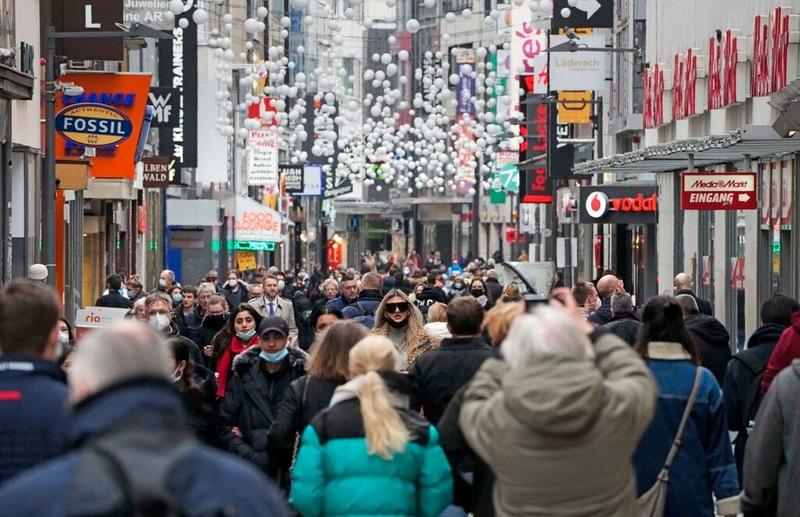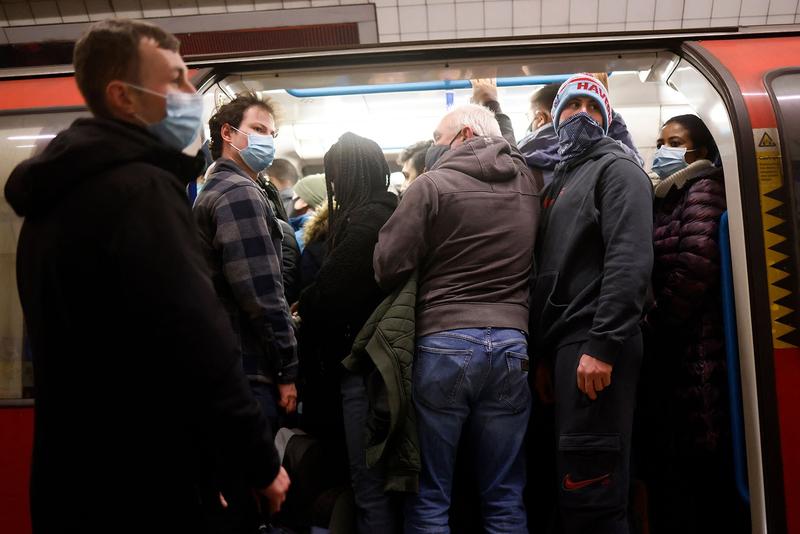England joins Nordic nations in lifting all restrictions
 People walk a shopping street in Cologne, Germany, Feb 9, 2022. (MARTIN MEISSNER / AP)
People walk a shopping street in Cologne, Germany, Feb 9, 2022. (MARTIN MEISSNER / AP)
More than once during the pandemic, United Kingdom Prime Minister Boris Johnson has referred to COVID-19 as the "nation's biggest challenge" since World War II, and hailed the British public for its stoicism.
The country's wartime stereotype of a "stiff upper lip" is a useful one to fall back on in times of crisis.
Johnson is now asking much of the population to "Keep Calm and Carry On", when all COVID-19 restrictions in England are to be lifted.
It really is all restrictions. The government is lifting a law that required infected people to self-isolate for a minimum of five days. People in England will have the choice to test positive and go about their business as normal, shopping, taking trains and visiting pubs and restaurants, while knowingly putting others at risk of infection.
That famous "Keep Calm" propaganda poster of 1939 encouraged Britons to carry on with their lives in the face of adversity. But it was also accompanied by huge amounts of government support and intervention when the bombs began falling on British shores.
Vaccines will effectively be the only line of defense left standing against the novel coronavirus in the UK by the end of next month, with the government announcing on Monday that free symptomatic and asymptomatic testing will end in England from April 1, despite objections from several public health bodies, including the National Health Service.
The removal of the self-isolation law does not appear to have much public support.
A survey from pollster YouGov found that 75 percent of Britons are in favor of current regulations. Just 17 percent support the change, which would see individuals and employers make their own decisions over restricted movements, as is the case with other respiratory ailments, such as colds or flu.
Some say they will continue to isolate following infection, regardless of the law.
Amber Anderson, 29, an actress from London, said: "I don't think I would take these new liberties if I tested positive for COVID-19. I honestly just wouldn't feel comfortable knowing I could be passing it on to someone more vulnerable than myself. I think if I tested positive I would try to avoid going to work, but stay at home."
Others are unsure if they will have much room for personal choice.
Emily Roberts, 44, a school teacher from West Sussex, recently spent 10 days at home recovering from COVID-19. Due to the legal requirement to self-isolate, her classes were covered by a supply teacher paid for by an insurer. Roberts does not know what would happen in the event of asymptomatic infection once the legal requirement for isolation ends.
"Morally, I would want to stay home to protect the population. But would I be obliged to go back to work, as long as I was feeling well enough, because the school would not be getting the financial support? I don't know the answer to that," she said.
"I am not looking forward to catching COVID-19 when restrictions are over and such decisions have to be made by individuals, with no clear-cut rule that says stay home when you are contagious."
Rachel McCloy, associate professor at the University of Reading's School of Psychology, said that from a behavioral science perspective, the shift represents a range of risks.
"Although we know that most people have followed guidance to be responsible … for those who have been more resistant, this change risks signaling they can feel free to take COVID-19 infections less seriously," McCloy said.
 Commuters wearing face masks crowd onto a subway train in London during the evening rush hour on Feb 14. (TOLGA AKMEN / AFP)
Commuters wearing face masks crowd onto a subway train in London during the evening rush hour on Feb 14. (TOLGA AKMEN / AFP)
Political move
In justifying its strategy, the UK government said hospitalizations and COVID-19 cases are falling. There is also strong immunity in the population thanks to high vaccination rates and a surge in infections in December brought on by the Omicron variant.
Data support this claim. COVID-19 cases have fallen over the past few weeks, according to the Office of National Statistics. In the week ending Feb 12, just under 2.5 million tested positive in England, or one in 20 people, compared with 1 in 19 the previous week. Meanwhile, more than 82 percent of adults in England have received three or more vaccinations.
However, the timing of the rule change has raised eyebrows. The end to the self-isolation law was originally scheduled for late next month, but Johnson surprised many on Feb 9 when he revealed plans to bring forward the change by four weeks.
Experts asked if the expedited timeline was based on solid evidence, after it emerged that several major health authorities had not been consulted.
British epidemiologist John Edmunds told ITV News the Scientific Advisory Group for Emergencies, or SAGE, which advises the government on COVID-19 policy, had not held discussions about moving changes forward.
Welsh Economy Minister Vaughan Gething told the BBC that there was no meeting between UK chief medical officers before Johnson's surprise announcement.
Some critics say the move is designed to distract from a number of controversies that have embroiled Johnson and also to appease a faction within his Conservative Party that has long lobbied against COVID-19 restrictions.
Johnson has faced calls to stand down following revelations that several parties and gatherings were held on government properties last year, in apparent breach of lockdown rules.
Christina McAnea, general secretary of UNISON, the biggest union in the UK, said, "Ditching COVID-19 rules while the virus rages suggests public health is less important to the prime minister than saving his job."
McAnea said that rushing through rule changes means that employers could find themselves at odds with existing health and safety regulations.
"Health and care staff faced the sack if they weren't double jabbed. Soon, they will have the green light to work, even if they've got COVID-19. Putting a match to sensible safety measures without providing guidance to employers is reckless and will cause confusion and alarm," she said.
Tim Spector, lead scientist on the ZOE COVID Study at King's College London, said the decision to bring forward an end to restrictions was politically motivated, and he encouraged people to continue to isolate if possible.
"Despite the government's hasty decision to end all restrictions this month, and the message this sends, this does not mean the pandemic is over, and we should all try to be good citizens by continuing to self-isolate when ill and protect ourselves and others from what can be a really nasty infection," Spector said.
Simon Clarke, associate professor in cellular microbiology at the University of Reading, said the pandemic remains in an "uncertain period", and lifting all restrictions may prove unwise, given unknown factors over the long-term impact of infection and the risk of new variants emerging.
"It will be an experiment which will either be shown to be very brave or very stupid, but nobody knows for sure what the result will be," Clarke said.
James Gill, a clinical lecturer at Warwick Medical School, is concerned that lifting the law will encourage infected people to push themselves to return to full activities too soon, potentially prolonging their recovery.
"Frankly, I see no justifiable reason for the scrapping of this law, certainly not from the perspective of patients," Gill said.
Some within the scientific community support the government's thinking.
Irene Petersen, a professor of epidemiology and health informatics at University College London, said it has made sense to slow COVID-19 and reduce transmission to ensure most people received vaccines, but now it may be time to change strategy.
"If we want to reduce serious illness and death from COVID-19, we should seek to speed the epidemic up," Petersen said on Twitter. "If we want the epidemic to come to an end in the UK, we need to reach a level where 95 percent have immunity, either from vaccine or infection."
About 38 million people have received third, or booster, vaccines in the UK in recent months, and Petersen said this presents a sensible window to lift restrictions before booster protection begins to wane later in the year and the risk of serious illness increases.
Terminology updated
Claims from some British media that the UK will be the first country to lift all COVID-19 restrictions are somewhat exaggerated.
Denmark dropped all such curbs from Feb 1, with Norway following suit soon after. In both nations, the four-day self-isolation guidance for infected people is a recommendation, not a legal requirement. Sweden scrapped all COVID-19 restrictions on Feb 9, and self-isolation has always been voluntary in the country.
Authorities in the three Nordic nations and the UK are also updating the terminology they use to classify the threat posed by COVID-19.
Denmark's Health Minister Magnus Heunicke said the novel coronavirus will no longer be characterized as a "socially critical disease", while Swedish Prime Minister Magdalena Andersson said her country is "moving into a new phase".
Norway's Prime Minister Jonas Gahr Store said COVID-19 is "no longer a major health threat" for most citizens, and Johnson has dubbed the end of restrictions the "strategy for living with COVID-19".
To some experts, these phrases are euphemisms for "endemic", the term given to a for which the spread, rates and presence are predictable.
In the United States, Kristian Andersen, an infectious researcher at Scripps Research in California, said it is far too early to redefine COVID-19 in this way.
He said some governments are acting under an "endemic delusion "or "belief that the pandemic is over".
"This is best exemplified by Denmark," Anderson wrote on Twitter. "Denmark effectively declared the pandemic over … despite the fact that cases, hospitalizations and test positivity are higher than ever, with deaths rapidly rising."
This assertion is borne out by the numbers-at the end of last month, when Denmark announced restrictions were to end, daily new cases averaged about 43,000, according to Our World in Data, representing a record high at that time. Daily hospitalizations were also at record levels, and confirmed deaths from COVID-19 were at their highest for a year, and rising.
The World Health Organization has warned countries against complacency, and said the world is not yet close to the end of the pandemic.
WHO Director-General Tedros Adhanom Ghebreyesus told reporters in South Africa on Feb 11 that the "acute phase" of the pandemic could be over by the middle of this year, but that will only be the case if 70 percent of the world is protected by vaccines. Currently, 62 percent of the global population has received at least one dose of vaccine, according to Our World in Data.
Late last month, David Nabarro, WHO special envoy for COVID-19, told Sky News it is "dangerous" to compare the with common and well-known respiratory illnesses.
Nabarro was responding to comments by UK Health Secretary Sajid Javid, who said at a Downing Street news conference, "We must learn to live with COVID, in the same way that we've learned to live with flu", and by Johnson, who told Parliament on Jan 19, "When COVID-19 becomes endemic, we will need to replace legal requirements with advice."
According to Nabarro: " (COVID-19) can mutate and form variants, and we've seen several, but we know there are more not far away. Quite honestly, we are not saying that this should be considered to be like flu or indeed like anything else-it's a new virus, and we must go on treating it as though it is full of surprises, very nasty and rather cunning."
He asked world leaders to "prevent people from getting infected "and "stay focused on the job", and also warned that "further surges "are to come.


